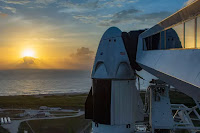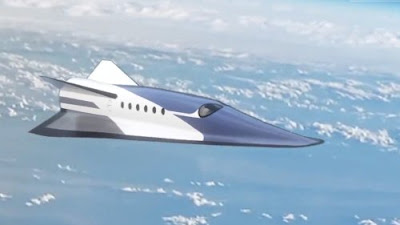SPACEX CREW DRAGON: HISTORIC SPACE LAUNCH
NASA, SPACEX, US Astronauts & Elon Musk
Many Historic Firsts on Earth and Space
On Wednesday, May 27, 2020, Elon Musk's SpaceX will carry two US Astronauts to the International Space Station (ISS). This will be the first time in nearly a decade that there has been rocket launch carrying astronauts into space orbit from US soil. It is also a first for SpaceX to carry humans - NASA astronauts - into space. And it is the first time that a private commercial vehicle has taken US astronauts into orbit. Experts say, if all goes well, this could be the beginning of a new era of human spaceflight for the US.
Launch Time
The launch is set for Wednesday afternoon from NASA's Kennedy Space Center in Cape Canaveral, Florida. President Donald Trump says he will be there. Two veteran US astronauts Doug Hurley and Bob Behnken will be the crew aboard the SpaceX Crew Dragon capsule that will rocket into space on a SpaceX Falcon 9 Rocket.
Into Orbit
The Falcon 9 Rocket will release Crew Dragon into a low Earth orbit 12 minutes after takeoff. The Falcon 9 Rocket is scheduled to return to Earth and land on a drone ship in the Atlantic Ocean. During the next 19 hours, the astronauts will orbit the Earth in Crew Dragon. They will be doing some manual flying of Crew Dragon including raising the altitude of its orbit to move toward and reach the International Space Station.
Autonomous Docking with ISS
Crew Dragon has an autonomous docking system and shouldn't need any human help to connect and deliver the astronauts to ISS. Using a series of sensors and cameras to fly toward the ISS, it is designed to latch on to the open docking port of the ISS. Crew Dragon has successfully launched to the ISS before without any humans onboard. SpaceX has been developing this spacecraft and, along with NASA, testing it for six years.
Crew Dragon & Solar Panels
Crew Dragon operates with solar panels that last about four months in space. So the US astronauts will work in the ISS for a few months. When NASA decides it's time to return home to Earth, Astronauts Hurley and Behnken will get back into Crew Dragon, plunge back into the Earth's atmosphere and four huge parachutes will lower them into the Atlantic Ocean off of Florida. Crew Dragon has many emergency scenario, fail-safe systems to help protect the crew should their be a significant failure during the journey. This is rocket science, so we're are wishing them the best of luck!
If you are fascinated by space missions, technology, and discoveries, go to my Amazon page and browse my books amazon.com/author/ekane
My "Space 2020's: What's Up There?" goes into a limited duration, Amazon promotion with a deep discount starting 5/27/20 ASIN: B087DV4DZ6
...
...
 |
| Source: NASA - Crew Dragon Capsule |
Many Historic Firsts on Earth and Space
On Wednesday, May 27, 2020, Elon Musk's SpaceX will carry two US Astronauts to the International Space Station (ISS). This will be the first time in nearly a decade that there has been rocket launch carrying astronauts into space orbit from US soil. It is also a first for SpaceX to carry humans - NASA astronauts - into space. And it is the first time that a private commercial vehicle has taken US astronauts into orbit. Experts say, if all goes well, this could be the beginning of a new era of human spaceflight for the US.
Launch Time
The launch is set for Wednesday afternoon from NASA's Kennedy Space Center in Cape Canaveral, Florida. President Donald Trump says he will be there. Two veteran US astronauts Doug Hurley and Bob Behnken will be the crew aboard the SpaceX Crew Dragon capsule that will rocket into space on a SpaceX Falcon 9 Rocket.
Into Orbit
The Falcon 9 Rocket will release Crew Dragon into a low Earth orbit 12 minutes after takeoff. The Falcon 9 Rocket is scheduled to return to Earth and land on a drone ship in the Atlantic Ocean. During the next 19 hours, the astronauts will orbit the Earth in Crew Dragon. They will be doing some manual flying of Crew Dragon including raising the altitude of its orbit to move toward and reach the International Space Station.
Autonomous Docking with ISS
Crew Dragon has an autonomous docking system and shouldn't need any human help to connect and deliver the astronauts to ISS. Using a series of sensors and cameras to fly toward the ISS, it is designed to latch on to the open docking port of the ISS. Crew Dragon has successfully launched to the ISS before without any humans onboard. SpaceX has been developing this spacecraft and, along with NASA, testing it for six years.
Crew Dragon & Solar Panels
Crew Dragon operates with solar panels that last about four months in space. So the US astronauts will work in the ISS for a few months. When NASA decides it's time to return home to Earth, Astronauts Hurley and Behnken will get back into Crew Dragon, plunge back into the Earth's atmosphere and four huge parachutes will lower them into the Atlantic Ocean off of Florida. Crew Dragon has many emergency scenario, fail-safe systems to help protect the crew should their be a significant failure during the journey. This is rocket science, so we're are wishing them the best of luck!
If you are fascinated by space missions, technology, and discoveries, go to my Amazon page and browse my books amazon.com/author/ekane
My "Space 2020's: What's Up There?" goes into a limited duration, Amazon promotion with a deep discount starting 5/27/20 ASIN: B087DV4DZ6



Comments
Post a Comment